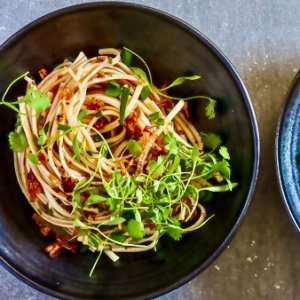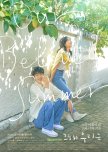An exceptional work of craftsmanship from script to casting to direction to acting
“Those who do cannot remember the past are condemned to repeat it.” - Harvard philosophy professor George Santayana
Sometimes we hear these phrases, like the one above and others, and they sound wise at first glance so we accept them as wholly and universally true. But if there is a whole and universal truth, it is much more likely that there are no whole and universal truths (except for, paradoxically, this one). “Our Beloved Summer” is a show about repeating the past - Woong and Yeon Soo having different values and backgrounds but loving each other despite them. In their past, the differences overcame them and they could not stay together.
Ironically, it was impossible for Woong and Yeon Soo not to remember their past as it was filmed in a documentary which remained popular into their adulthood. Can their familiarity with the past help them not to repeat it? That’s not really the issue though, whether for them or anyone else. Knowing the past but not recognizing how to change the present and future is useless.
The show isn’t built around the soundtrack like an idol drama, nor does it feature innovative or elaborate production design or wardrobe. But the crew for these elements were terrific. V’s “Christmas Tree” was one of many outstanding songs featured. The wardrobe for Woong in particular was stellar. And the locations where this show was shot were tops.
Woong is almost a polar opposite, on the exterior, of a typical male lead. Outwardly, he’s lazy and a coward. In the hands of a less talented actor than Choi Woo Shik, Woong could have been a disaster of a character and sunk the show. But this performance is mesmerizing and further solidifies Choi Woo Shik’s status as one of the most talented actors of any age and hailing from anywhere. That Woong is talented as an artist is made clear from early on but it is his inner emotional strength, that he will shrug off his own troubles and stand beside and lift up someone else who is suffering is where Woong really shines as a character.
If there’s a trope that “Our Beloved Summer” fails to avoid, it’s that if the two main characters had simply communicated openly and honestly with each other, they could have avoided many of their troubles. Well, hard to avoid here since the foundation of the story is that they’re separated after a five year relationship. But the show misses when it spends almost its entire first half focusing on the narrative primarily from Woong’s perspective. Yeon Soo’s inner thoughts are only momentarily illuminated until after the midpoint. The result is that she’s portrayed as an unapologetic bad guy between the two and Woong is the innocent victim. While the reality is that she did break things off, there’s much more nuance to Yeon Soo but it’s not revealed for a long stretch.
Once “Our Beloved Summer” delves further into Yeon Soo’s character, however, she comes alive as a layered character, tragically unselfaware while driven and loyal and smart. As the show proceeds, particularly in the final few episodes, Kim Da Mi’s portrayal gets better and better. She deftly alternates between lighter humorous scenes and raw emotional displays. There are probably examples of a finer pair of performances by both male and female leads in a production, but none spring to mind immediately.
The two secondary leads, unfortunately, do not leave the same impression. Kim Sung Chul and Roh Jeong Nui are both fine actors and perform admirably. The characters they play, however, are lackluster. Kim Sung Chul’s Ji Woong is an emotionally stunted friend of the main characters that is effective only briefly as a prop to move the arc forward between Woong and Yeon Soo. His own storyline is far and away the least compelling portion of the production. Meanwhile, Roh Jeong Nui’s NJ is an atypical idol with a crush on Woong. She has a brief but unnecessary subplot of her own that primarily just whets a viewer’s appetite for a return to focusing on any other part of the show.
An additional note is that “Our Beloved Summer” has one of the finest supporting cast ensembles of any show. If there is an easy layup in drama casting, it is to always, whenever possible, include Park Jin Joo as the female lead’s quirky bff. She’s as marvelous as ever here. But there’s standout performances as well from Ahn Dong Goo as Woong’s manager, Seo Jung Yeon and Park Won Sang as Woong’s parents, Jo Bok Rae as a senior television producer, Jung Kang Hee as a neighborhood hardware store owner and the sublime Kwak Dong Yeon makes several guest appearances as a fellow/rival artist to Woong.
Kim Yoon Jin nails how to handle the key emotional scenes. He lets the actors take over. The soundtrack takes a pause. There’s no moving cameras. The best example is the scene at the end of episode 11 where Yeon Soo struggles to find the words she wants to say to Woong. Technically, it is as simply presented a scene as a viewer will find. But it is an emotional powerhouse of a scene. Narratively, the show only strengthens as it nears its end. It continues to deliver humor, warmth and tenderness until its final moments.
If “Our Beloved Summer” were to be summed up in a single word, it would be warmth. We can all use more of that and so it is most highly recommended.
Sometimes we hear these phrases, like the one above and others, and they sound wise at first glance so we accept them as wholly and universally true. But if there is a whole and universal truth, it is much more likely that there are no whole and universal truths (except for, paradoxically, this one). “Our Beloved Summer” is a show about repeating the past - Woong and Yeon Soo having different values and backgrounds but loving each other despite them. In their past, the differences overcame them and they could not stay together.
Ironically, it was impossible for Woong and Yeon Soo not to remember their past as it was filmed in a documentary which remained popular into their adulthood. Can their familiarity with the past help them not to repeat it? That’s not really the issue though, whether for them or anyone else. Knowing the past but not recognizing how to change the present and future is useless.
The show isn’t built around the soundtrack like an idol drama, nor does it feature innovative or elaborate production design or wardrobe. But the crew for these elements were terrific. V’s “Christmas Tree” was one of many outstanding songs featured. The wardrobe for Woong in particular was stellar. And the locations where this show was shot were tops.
Woong is almost a polar opposite, on the exterior, of a typical male lead. Outwardly, he’s lazy and a coward. In the hands of a less talented actor than Choi Woo Shik, Woong could have been a disaster of a character and sunk the show. But this performance is mesmerizing and further solidifies Choi Woo Shik’s status as one of the most talented actors of any age and hailing from anywhere. That Woong is talented as an artist is made clear from early on but it is his inner emotional strength, that he will shrug off his own troubles and stand beside and lift up someone else who is suffering is where Woong really shines as a character.
If there’s a trope that “Our Beloved Summer” fails to avoid, it’s that if the two main characters had simply communicated openly and honestly with each other, they could have avoided many of their troubles. Well, hard to avoid here since the foundation of the story is that they’re separated after a five year relationship. But the show misses when it spends almost its entire first half focusing on the narrative primarily from Woong’s perspective. Yeon Soo’s inner thoughts are only momentarily illuminated until after the midpoint. The result is that she’s portrayed as an unapologetic bad guy between the two and Woong is the innocent victim. While the reality is that she did break things off, there’s much more nuance to Yeon Soo but it’s not revealed for a long stretch.
Once “Our Beloved Summer” delves further into Yeon Soo’s character, however, she comes alive as a layered character, tragically unselfaware while driven and loyal and smart. As the show proceeds, particularly in the final few episodes, Kim Da Mi’s portrayal gets better and better. She deftly alternates between lighter humorous scenes and raw emotional displays. There are probably examples of a finer pair of performances by both male and female leads in a production, but none spring to mind immediately.
The two secondary leads, unfortunately, do not leave the same impression. Kim Sung Chul and Roh Jeong Nui are both fine actors and perform admirably. The characters they play, however, are lackluster. Kim Sung Chul’s Ji Woong is an emotionally stunted friend of the main characters that is effective only briefly as a prop to move the arc forward between Woong and Yeon Soo. His own storyline is far and away the least compelling portion of the production. Meanwhile, Roh Jeong Nui’s NJ is an atypical idol with a crush on Woong. She has a brief but unnecessary subplot of her own that primarily just whets a viewer’s appetite for a return to focusing on any other part of the show.
An additional note is that “Our Beloved Summer” has one of the finest supporting cast ensembles of any show. If there is an easy layup in drama casting, it is to always, whenever possible, include Park Jin Joo as the female lead’s quirky bff. She’s as marvelous as ever here. But there’s standout performances as well from Ahn Dong Goo as Woong’s manager, Seo Jung Yeon and Park Won Sang as Woong’s parents, Jo Bok Rae as a senior television producer, Jung Kang Hee as a neighborhood hardware store owner and the sublime Kwak Dong Yeon makes several guest appearances as a fellow/rival artist to Woong.
Kim Yoon Jin nails how to handle the key emotional scenes. He lets the actors take over. The soundtrack takes a pause. There’s no moving cameras. The best example is the scene at the end of episode 11 where Yeon Soo struggles to find the words she wants to say to Woong. Technically, it is as simply presented a scene as a viewer will find. But it is an emotional powerhouse of a scene. Narratively, the show only strengthens as it nears its end. It continues to deliver humor, warmth and tenderness until its final moments.
If “Our Beloved Summer” were to be summed up in a single word, it would be warmth. We can all use more of that and so it is most highly recommended.
Cet avis était-il utile?


 1
1




















